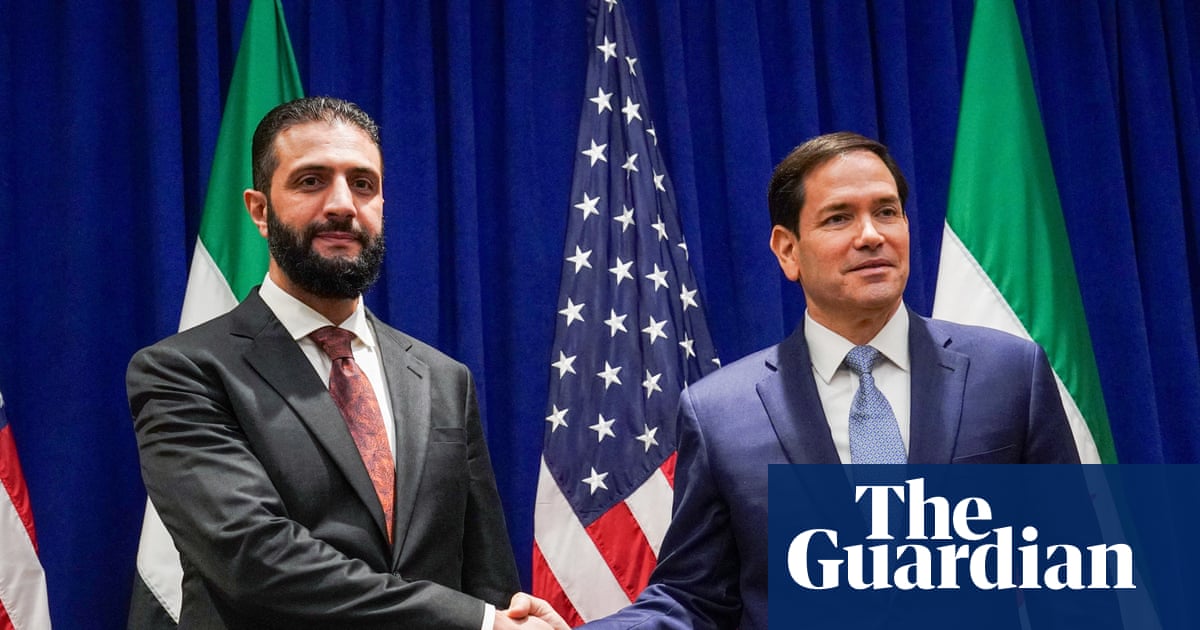Not too long ago, Ahmed al-Sharaa – better known by his nom de guerre Abu Mohammed al-Jolani – would have been arrested on arrival in the US. The former head of Syria’s al-Nusra Front had a $10m bounty on his head for organising “multiple terrorist attacks throughout Syria, often targeting civilians”.
This week, however, after toppling the dictator Bashar al-Assad in a lightning offensive last December, he is being feted in New York as he meets with world leaders in the first visit to the United Nations general assembly by a Syrian head of state since 1967.
“For long years we suffered injustice and deprivation and oppression,” said Sharaa, dressed in a grey tailored suit and burgundy tie, in his address. “Then we rose in claiming our dignity.”
He faces a daunting task at this week’s United Nations general assembly: to cut the figure of a statesman who can assuage concerns about his past, quell fears over the sectarian violence, and navigate tricky regional diplomacy with the United States and Israel – while also maintaining the hardline reputation at home that carried him to power.
The former militant’s arrival has led to surreal scenes in Turtle Bay. On Tuesday evening, one of the hottest tickets in the city was at an ornate private members’ club in midtown Manhattan filled with businesspeople, diplomats and journalists, where Sharaa opined on his journey from jihadist to statesman in a “fireside chat” for the Middle East Institute.
His responses to skepticism about his transformation are practised: critics should not judge his past, which included membership in al-Qaida, without the context he lived in. “Anyone watching a child being killed in the streets will revolt,” he said at one point according to a live translation of his remarks in Arabic. “The pressure led people to seek solutions within the scope of the means available to them.”
A day earlier, he was sitting down with David Petraeus, the former CIA director and ex-US army general who headed multinational forces in Iraq while Sharaa was fighting and imprisoned there alongside other members of al-Qaida.
“It is good that at one time we were in combat, and now we are in dialogue,” Sharaa said, smiling to his former enemy. “Someone who went through war is one who knows best the importance of peace.”
Privately, Trump administration officials recognise that the US has no backup plan to Sharaa’s leadership in Syria, and that he is the best chance to prevent Syria’s return to civil war. While pushing him to calibrate his remarks about Israel and to crack down on acts of sectarian and retributive violence at home, there are also concerns of estranging him from his base and local power circles.
“He is jumping through the hoops to show that he can be a world leader, not just a fighter,” said one US official who has met with Sharaa. “All of this is very carefully calibrated … So far, he is pulling it off.”
At one point, Petraeus turned almost tenderly to the former leader of Hay’at Tahrir al-Sham, which was only delisted as a foreign terrorist organisation in July, and asked him a “more personal question”.
“How are you holding up under all this pressure? Are you getting time to do some thinking? Are you getting enough sleep at night? I have been there and it is so very, very hard, and your many fans – and I am one of them – we have worries.” The room at the Concordia centre burst into applause.
In his public appearances, Sharaa has said there is a chance for a peace deal with Israel, but he has also said that Syria is “scared” of Israel’s foreign policy in the region – and balked at the idea that Syria would join the Abraham accords normalising relations with Israel, pointing to anger at home over Israeli airstrikes on Syria and over the war in Gaza.
Another of Sharaa’s key goals while in New York this week is to lobby for the US to drop sanctions on Syria. While Donald Trump terminated some sanctions in June, the Caesar Syria Civilian Protection Act of 2019 would require congressional repeal, which might not be immediately forthcoming.
Before walking into a meeting with Marco Rubio, Sharaa responded to a question about lifting the sanctions by shrugging toward the US secretary of state, as though to say: it’s not up to me, it’s up to him.
“The Syrian people should not be killed another time through the sanctions,” Sharaa said this week. “The Syrian people love work. Lift the sanctions, and don’t worry about them.”
